Champions Cup knockouts will reveal if Premiership sides are actually any good
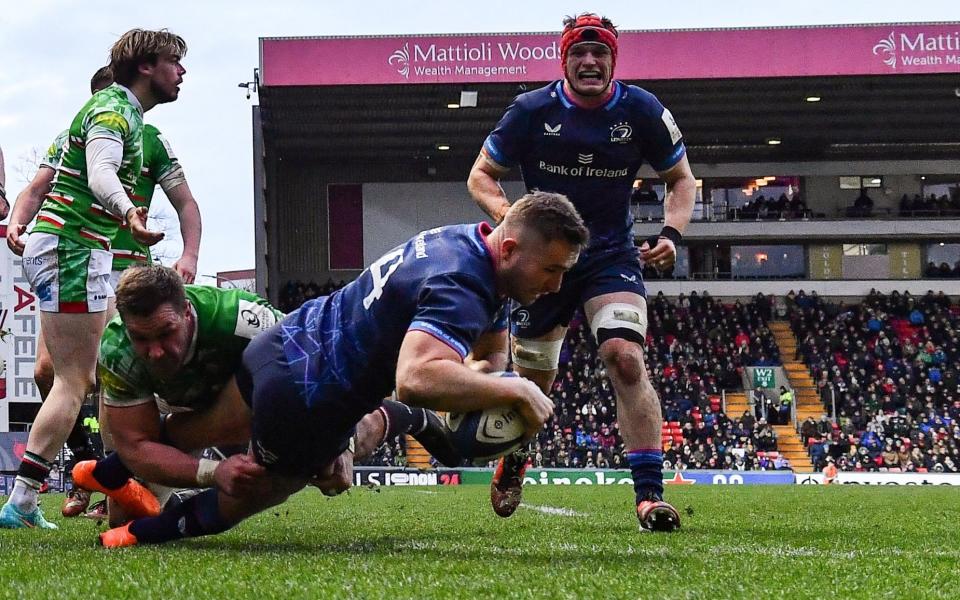
Romantics regard the P-word as rather grubby in a sporting context, yet the current campaign is reinforcing that the Premiership can be a compelling product.
Unpredictability begets entertainment and, since the league’s return after the Six Nations, all clubs except two – resurgent Bristol Bears, who won both, and battling Newcastle Falcons, who lost both – have recorded one victory and one defeat from two fixtures. A dramatic denouement is inevitable on the domestic front. But how good is the Premiership, really, relative to other competitions across the globe? Or, because these things can be mutually exclusive, does it actually contain any good teams? The second question feels harder to answer than ever.
Sneering scepticism certainly persists and, sometimes, blinkered ignorance is blissful. But a fortnight of Champions Cup knockout games, with the last-16 and then the quarter-finals over the next two weekends, will hold up a mirror to the six Premiership contestants left.
Eight English clubs returned a combined record of 19 wins from 32 pool matches in the Champions Cup this season. One, Northampton Saints, claimed a top-three seeding, guaranteeing them two home ties in a row if they keep progressing. That is a highly respectable return and better, in terms of win percentage, than any other competing nation apart from South Africa. Bulls and Stormers managed six victories from eight outings as a collective.
The respective demises of Worcester Warriors, Wasps and London Irish seem to have off-set the reduced salary-cap and contributed to Premiership success so far by concentrating talent among 10 clubs rather than 13 – Fin Smith’s switch to Northampton was fast-tracked and Bath bagged Alfie Barbeary, as just two examples of natural redistribution. Steve Borthwick, the England head coach, is among those to have complimented performances in the Champions Cup. Yet there is a tangible sense of flux about the Premiership, too. Fewer squads are truly settled. Amid the challenges presented by a disjointed season following a World Cup, the ability to gel quickly has been valuable.
For all its faults – a confusing format chief among them – the Champions Cup remains an acid test of how coaches use their resources to implement an effective strategy. And a sobering fact is that since Exeter Chiefs won the tournament in 2020, the next three full seasons only saw one Premiership semi-finalist: Rob Baxter’s charges again, last year. This is despite the Premiership continuing to hold their eight qualifying spots.
Given the pedigree of La Rochelle, Leinster and Toulouse, as well as how the South African franchises have established themselves, two semi-finalists from the Premiership would be an impressive result. Is that viable, then? Which Premiership teams in the Champions Cup hunt are actually any good?
Northampton Saints
Seed after pool stage: 3rd
Possible route to a semi-final: Munster (H), Bulls/Lyon (H)
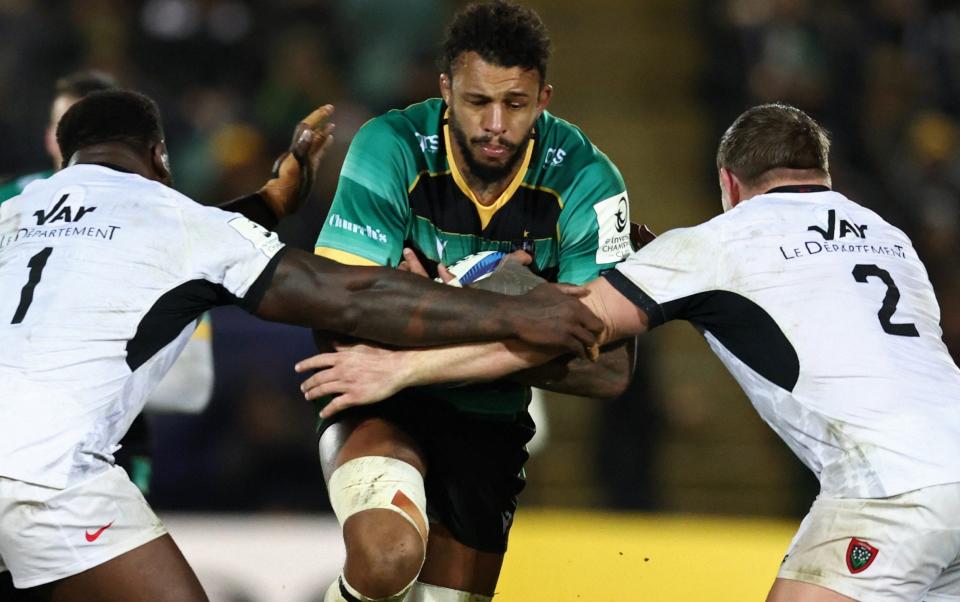
Yes, although the answer would be more emphatic if Alex Mitchell and George Furbank were fully fit. This season, after recruiting shrewdly to bring in players like Curtis Langdon and Tom Pearson as well as Burger Odendaal in the backs, Saints have complemented flowing attack with collective toughness, both defensively and in the carry. Away triumphs at Scotstoun and Thomond Park consolidated exceptional domestic form and validated the improvements inspired by Phil Dowson’s coaching team.
Significant departures, with Courtney Lawes and Lewis Ludlam among the summer leavers, might make this their best chance of fighting on two fronts for a couple of years. Then again, they have plenty of exciting youth and a backline that will keep growing together.
Explosive wing Ollie Sleightholme, who turns 24 this month, appears to have found another level of late. Provided the loss to Bristol Bears was a blip – and the subsequent defeat of Saracens suggests so – Northampton should be capable of reaching the last four. They must produce two more big wins to do so, beginning against Munster, who did not field RG Snyman in January and may have the colossal Springbok back to wreak havoc on the East Midlands.
Either way, another duel between Fin Smith and Jack Crowley will be delicious. The former’s kicking game and distribution will be vital to the hosts.
Harlequins
Seed after pool stage: 5th
Possible route to a semi-final: Glasgow (H), Bordeaux-Bègles (A)/Saracens (H)
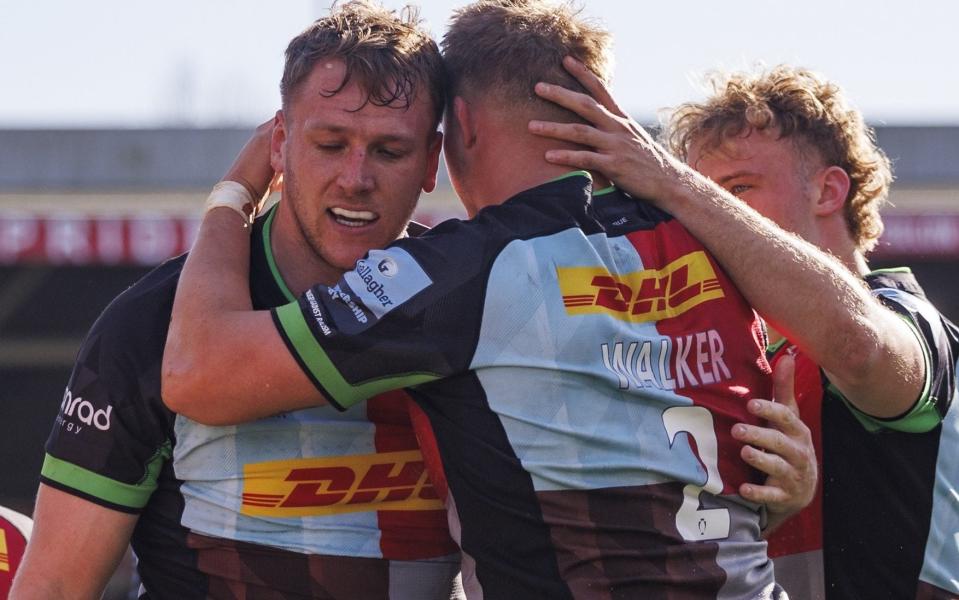
Quins are still able to conjure delightful tries from numerous scenarios – incisive set moves, slicing kick-returns and intuitive phase-play – but Harlequins have also been decidedly flakey in patches. They shipped 88 points in the first two Premiership matches since Jerry Flannery, their erstwhile defence coach, left to join South Africa. Saracens picked them apart and Bath almost overhauled a 40-3 deficit on Saturday. That is an alarming trend.
In the pool stages, they blew hot, beating Racing 92, Ulster and Cardiff in thrilling fashion, with Alex Dombrandt and Marcus Smith outstanding, but were tormented by Toulouse at the Twickenham Stoop and ultimately thumped 47-19. Three victories, each with a bonus point, has yielded a handy draw; not that Glasgow Warriors, second in the United Rugby Championship and fresh off thrashing Scarlets, will roll over on Friday night. And then they must either visit Bordeaux or welcome Saracens.
An unfortunate injury cluster also compromises Harlequins. When several similar players covering the same position become unavailable, a team must rethink and rebalance. With Jack Kenningham, James Chisholm and Chandler Cunningham-South all sidelined, Harlequins have needed to station Stephan Lewies at blindside flanker and promote Will Trenholm to the bench. Chisholm and Cunningham-South, especially given the latter’s exploits during the Six Nations, would probably have dovetailed in the same match-day. Their concurrent absence stings.
Exeter Chiefs
Seed after pool stage: 8th
Possible route to a semi-final: Bath (H), Toulouse (A)/Racing 92 (H)
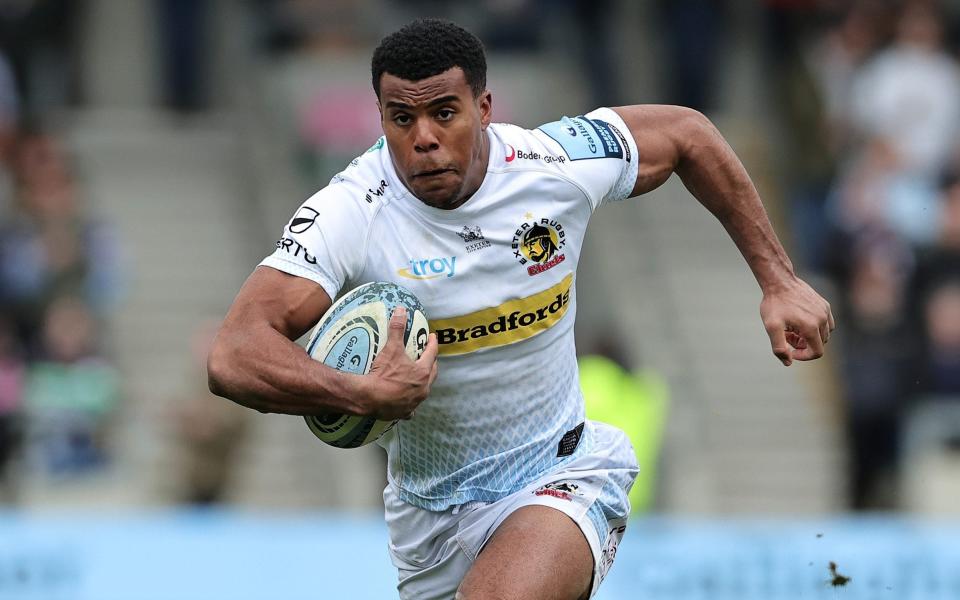
Not as good as they will be, which is no insult whatsoever. Rob Baxter would admit that his gutsy group has defied expectations this season, because they are palpably in a rebuilding stage. Relative veterans such as Jack Yeandle, Henry Slade and Jacques Vermeulen are guiding two tiers of youngsters – more established ones like Dafydd Jenkins, Lewis Pearson , Josh Hodge and Rus Tuima and emerging gems like Greg Fisilau, Ross Vintcent and Immanuel Feyi-Waboso. Christ Tshiunza and Richard Capstick returning to fitness increases Exeter’s options. They will never want for size and dynamism up front and an all-action blitz defence, overseen by Omar Mouneimne, is fun to watch.
Late comeback victories over Toulon and Munster showcased resilience amid chaos, while Chiefs also hung tough to oust Glasgow in a controversial finish. Those results have thrust them, ahead of schedule, into the latter stages of a competition that has given the club fond memories. A team free from the scars of failure can be dangerous. Then again, Exeter lapsed to lose 41-5 to Sale Sharks on Sunday. They will need to respond immediately. If there is one question mark it is that they are probably short of nous and know-how at half-back. But they will not give up.
Bath
Seed after pool stage: 9th
Possible route to a semi-final: Exeter Chiefs (A), Toulouse (A)/Racing 92 (H)

All the elements, except for collective experience, are there now. Finn Russell has added his blend of swagger and astute decision-making, with other playmakers like Ben Spencer and Cameron Redpath to alleviate pressure on him. Bath also did very well in the fall-out from 2022-23, picking up Ted Hill and Ollie Lawrence from Worcester and Alfie Barbeary and Lee Blackett from Wasps. They have burly props, lots of back-rowers and athleticism out wide.
One problem for them is that history tells us how important the pain of losing is to the journey of champions in this competition. Have Bath’s players been through enough together? Do they need to have been? Can they rewrite accepted wisdom?
Another issue is that, having only finished eighth in the Premiership last season, Bath had to travel to Toulouse in January for their final pool encounter. They scored three first-half tries, but fell away to lose 31-19. Such is the nature of the draw that they could have to hop across The Channel again, to face Toulouse again, should they triumph at Sandy Park.
Perhaps the most worrying aspect of Bath conceding 40 points in 48 minutes to Harlequins on Sunday was that Johann van Graan had not rotated his team as markedly as for other trips to Sale and Leicester. The head coach will hope that any rust has been shaken off for the resumption of this Champions Cup bid.
Saracens
Seed after pool stage: 13th
Possible route to a semi-final: Bordeaux-Bègles (A), Harlequins(A)/Glasgow Warriors (A)
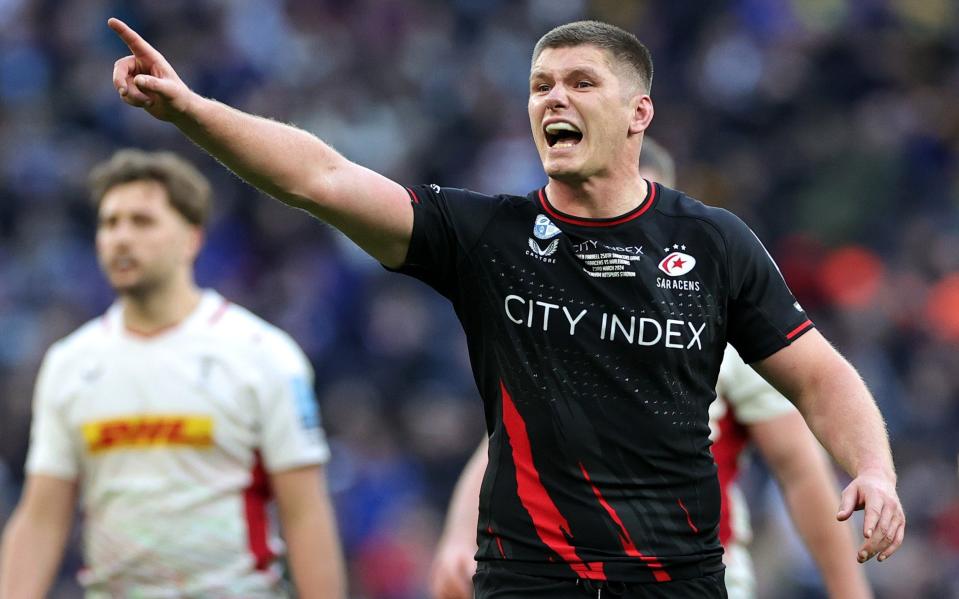
Tough to say. Will the last dance be bold and precise or apologetic and frail? On the evidence of the past six months – comprising a difficult season illuminated by flashes of commanding class, mostly against Harlequins – it is hard to see Saracens adding a poignant fourth Champions Cup crown in Tottenham to send off Owen Farrell and other illustrious leavers.
Mark McCall is on the precipice of a fascinating squad revamp, as Exeter were a year ago. This was symbolised by Tuesday’s announcement that Canterbury and Crusaders fly-half Fergus Burke will arrive in the summer on a “long-term deal”. Phil Brantingham and Rhys Carré have been signed, seemingly, to succeed Mako Vunipola and, with other back-rowers renewing terms, Billy Vunipola appears to be off as well. Fairytale endings in sport are rare.
Saracens have missed Alex Lozowski in midfield and, frankly, look jarringly fragile; defensively uncertain out wide and short of sheer heft in the tight five. There is a reason that Will Skelton, a former Saracen, has featured in four of the last five Champions Cup finals, winning three of them. Bordeaux battered McCall’s men in January and will be licking their lips ahead of this weekend. But Saracens do have plenty in their favour. In Ben Earl and Juan Martín González, they boast two of the competition’s in-form players. Alex Goode, Farrell, Jamie George and the Vunipola brothers are among the most decorated players in history. Maro Itoje is not far behind. They have all upset the odds before and relish knockout rugby.
Leicester Tigers
Seed after pool stage: 15th
Possible route to a semi-final: Leinster (A), Stormers(A)/La Rochelle (A)
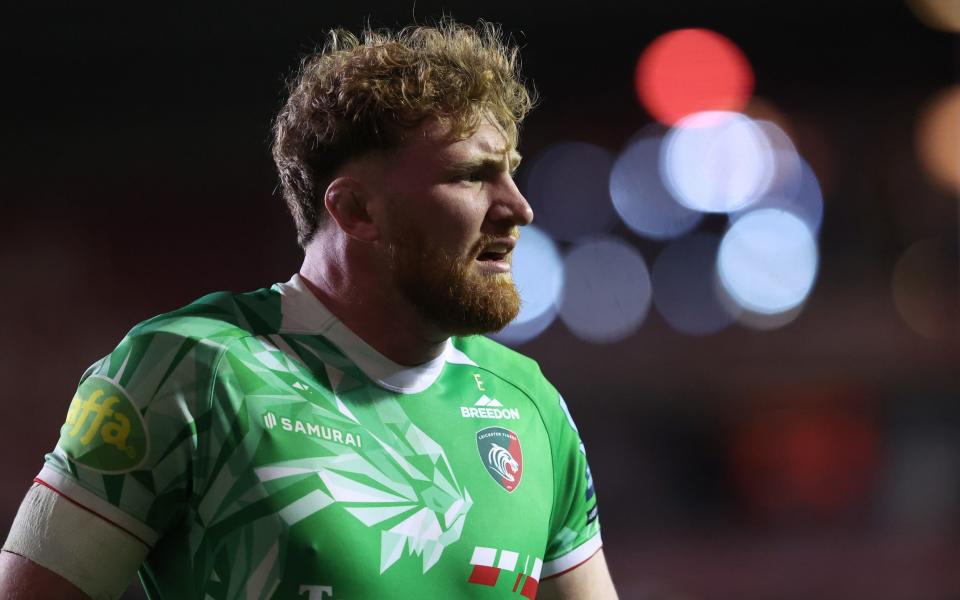
Their current standing of seventh in the Premiership, having lost to the second-bottom side in Gloucester before edging out Newcastle, one rung below the Cherry and Whites at the foot of the table, is a fair reflection of Leicester’s season. That is a diplomatic way of saying that Tigers have been underwhelming in Dan McKellar’s first campaign at the helm.
The absence of Alan Dickens, who joined as attack coach last summer, cannot have been helpful. Away wins over Bath, Stade Français and Harlequins, as well as a scrum and maul masterclass against Saracens, have been Leicester’s most convincing displays yet. They will need more – far more – to topple Leinster, whom they are meeting for a fourth time in three seasons.
Tigers have lost all of these encounters, coming closest in the 2022 quarter-final, where they went down 23-14. And while one might expect these sighters to give Tigers a chance, familiarity does not seem to help many teams against the Dublin province.
Dan Cole, Ollie Chessum and George Martin all started England’s fine win over Ireland last month, which was founded on disruptive defence and opportunistic attack. Leicester have more star quality in Julián Montoya, Tommy Reffell, Jasper Wiese, Handré Pollard and Freddie Steward. Jack van Poortvliet has returned brightly and Ollie Hassell-Collins is pushing on. Channeling all that talent towards a coherent, connected team performance is proving elusive.

 Yahoo Sport
Yahoo Sport 





































